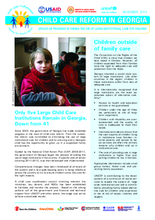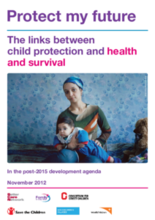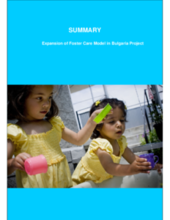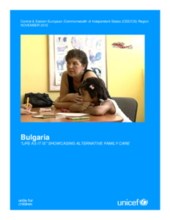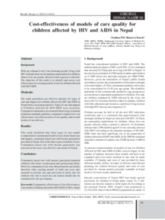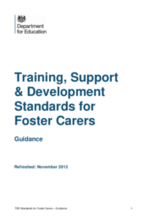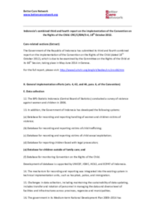Displaying 1301 - 1310 of 1787
The document highlights the recent child care reform in Georgia under the partnership of the Ministry of Labor, Health, and Social Affairs of Georgia and UNICEF and provides an update on progress of ending the use of large institutions care for children.
This inter-agency paper was written by Family for Every Child, Better Care Network, Consortium for Street Children, Save the Children, SOS Children’s Villages, and World Vision, for submission to the United Nations consultation: ‘Health in the Post-2015 Development Agenda.’ It examines the links between child protection and health and argues for a continuing focus on health and child survival that encompasses particular goals and indicators on children’s protection.
This summary report describes the project UNICEF has undertaken with the government of Bulgaria to establish a nationwide regional approach to foster care development based on its pilot experience. The project included a national public awareness campaign, establishment of specialized foster care services, and capacity building of the statutory child protection bodies.
This research paper provides a brief overview of the Vietnam Babylift and of a more recent child abduction attempt in Chad. Then, turning to the history of child abduction and adoption history in Latin America, the paper presents the conflicts of El Salvador and Argentina and discusses ‘living disappeared’ children – those who disappear into adoption networks during war. The research explores the post-conflict social realities in both nations. The role of the social worker and specific practices are identified and discussed in context of generalist social work practice.
This report gives an overview of the documentary reality TV series, “Life as it is-foster families,” which UNICEF in Bulgaria launched in 2010 as a part of its agenda to stop children under 3 years of age from being placed in institutions and to close the infant homes for institutional care.
This research study aimed to identify and assess the cost effectiveness for existing models of care for children affected by HIV and AIDS in Nepal. The study performed a cost effective analysis for three types of care models in order to provide program managers and childcare professionals comparative economic evidence of the cost of caring for these children.
The Training, Support and Development (TSD) standards form part of a foster carer's induction into the role. They provide a national minimum benchmark that sets out what foster carers should know, understand and be able to do within the first 12-18 months after being approved.
This paper provides insight into child protection in the context of coordinated action, the architecture of U.S. government assistance, the state of evidence-base, development of appropriate research framework, practice and policy, ethical considerations, and capacity development and knowledge transfer for those advocating for children outside of family care. Recommendations are made to consider how current operational contexts, collaborative relationships and learning-knowledge can be united to focus on the various categories of children outside of family care.
In this TED Talk, poet and playwright Lemn Sissay tells his story of growing up in foster care in the UK.
Care related section of the Government of the Republic of Indonesia's third and fourth combined report on the implementation of the Convention on the Rights of the Child (dated 18th October 2012).

